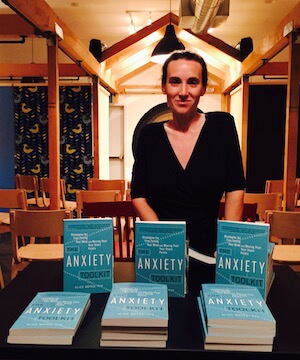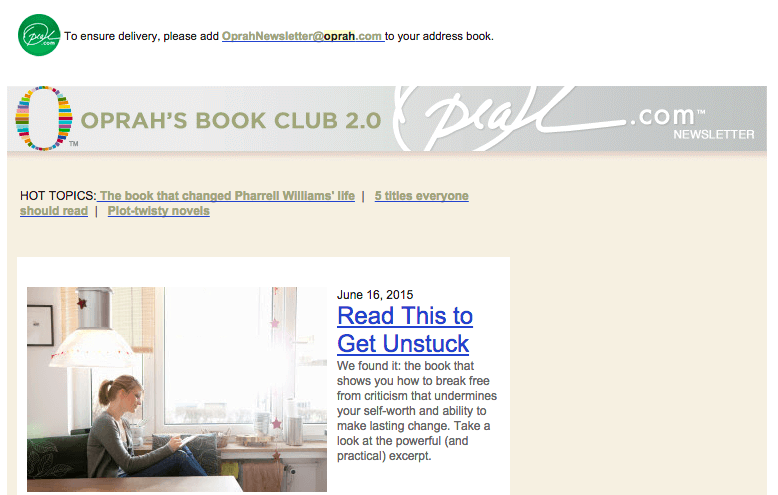This is a longer version of the main quiz.
The quiz questions below will give you a sneak peek of the type of problems The Anxiety Toolkit book aims to solve, and how the book can help you. Pick the answer that best applies, even if no answer is the perfect fit. Write the question numbers and your answers down, and then use the scoring key that follows the quiz to interpret your scores.
1. Are you more like? (Ch. 2 and 5)
(A) Jon Hamm
(B) My level of neuroses falls somewhere in the middle of those!
(C) Woody Allen
2. Are you prone to overthinking? (Ch. 2 and 5)
(A) No. I tend to deal with problems quickly and move on.
(B) Sometimes a worry thought gets stuck in my brain, but not generally.
(C) When I’m worried about something, those thoughts tend to whirr around for ages and bother me.
3. Do you tend to personalize it when things don’t go according to plan? (Ch. 5 and 7)
(A) Nope.
(B) Occasionally.
(C) I tend to assume things are my fault, and overthink about what I could’ve done differently to have a different outcome.
4. When you think about possible outcomes of taking action, do you tend to?
(A) Think about the best, worst, and most likely things that could happen.
(B) Overestimate the chances of negative outcomes.
(C) Assume negative outcomes are likely.
5. Do people tell you “don’t worry so much” or “relax”? (Ch 2.)
(A) No.
(B) From time to time.
(C) Frequently, and it annoys me!
6. When you contemplate trying new things, do you tend feel like you’re fighting your anxiety? (Ch. 3)
(A) No, I might feel anxiety when I’m pursuing new things but I feel confident in my skills for coping.
(B) Sometimes.
(C) Yes!
7. How easy is it for you to move from ideas to action when you’re not 100% sure you’ll succeed? (Ch. 4)
(A) Easy, I know there are few things that are 100% sure in life. I can tolerate the unknown.
(B) I tend to take a long time to work up to taking action.
(C) Failure would be so embarrassing for me that I only do things where I’m sure of success.
8. Do you tend to criticize yourself for feeling anxiety? (Ch. 5)
(A) No, it’s part of my nature but it doesn’t make me a flawed person. I know how to successfully work with my nature.
(B) I wish I wasn’t so anxiety prone and was more cool, calm, and collected.
(C) I feel kinda ashamed of my predisposition to anxiety. It affects my self-confidence and self-esteem.
9. Do you strive for perfection because you worry about the consequences of not performing perfectly? (Ch. 6)
(A) No, I might strive for high standards but I know that constant perfection isn’t achievable.
(B) When I’m in a new situation but this worry goes away once I’ve established relationships and a track record.
(C) Yes, I tend to think people will only like and respect me if I don’t make mistakes.
10. How much time and effort do you put into thinking about anxiety or worries? (Ch. 4, 5, and 9)
(A) When I feel anxious it passes quickly.
(B) Anxiety raises it’s head from time to time for me, and when it does I can get stuck in overthinking, but I don’t feel anxious every week.
(C) Multiple hours every week.
11. When anxiety occurs for you, do you have easy strategies that you feel confident using? (Ch. 1 and 8)
(A) I know some strategies and I’ve personalized them so that they suit my preferences and situation.
(B) I know some strategies but they seem impractical or too much hard work, and therefore I don’t use them.
(C) My #1 strategy is to avoid things that make me anxious.
If you scored…..
Mostly A’s
If you’re prone to anxiety, you’ve reached a place where you can work with it successfully. You don’t have a sense of fighting with your anxiety. Instead you accept when it occurs and use your skills for working with your anxiety-related thoughts and feelings. You’ll learn some additional tips and tricks from reading The Anxiety Toolkit, but reading the book will also confirm all the things you’re doing right in managing your anxiety.
Mostly B’s
You don’t feel anxious all the time but you could use some better strategies for when anxiety strikes. Finding the strategies that are a good fit for you will help anxiety pass more quickly when it occurs. You’ll feel confident that you can take on challenges, even if doing so involves anxiety. At the end each of the quiz questions above, you’ll see a note as to which chapter/s are most relevant to that question. Look at where you’ve answered Bs and Cs to see which parts of the The Anxiety Toolkit are likely to be most interesting to you.
Mostly C’s
Anxiety is a big deal for you. If you use strategies, they’re probably the type that tend to make your anxiety worse rather than better overall. For example, avoiding situations or avoiding getting things done if that would trigger anxiety. You probably have a sense that you’re not “living your best life” as Oprah would say. When your worries get triggered, they can feel like an unstoppable train that you can’t get off. If you’re currently living in mostly C’s territory, The Anxiety Toolkit has strategies that will help you move up to A’s and B’s. An important key to your success is likely to be treating yourself more kindly when you feel anxious, rather than criticizing yourself or going down the wormhole of rumination. Try starting at the beginning of the book. Where you gave a B or a C answer, notice the chapter numbers that appear after those questions, and pay extra attention to those chapters. It might seem like you have a lot to work on but you can use The Anxiety Toolkit like a recipe book, and just try out those “recipes” that strike your fancy.
The Anxiety Toolkit is available wherever books are sold.






